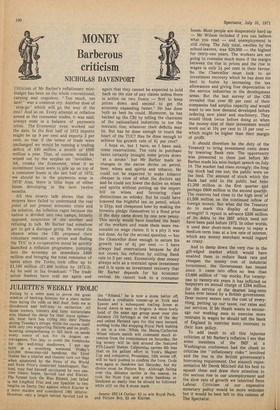JULIETTE'S WEEKLY FROLIC
Failing by a mere nose to prove the great wisdom of backing Stintino for a place rather than laying the odds on Mill Reef, finds me at Goodwood and half-way to extinction. All those owners, trainers and form statisticians who blamed the damp for their Ascot upheavals, must have ben crying into their Pimms during Tuesday's deluge, while the course itself with only two supporting fixtures and no profitboosting steeplechasing to fall back on needs every ounce of sun for its August extravaganza. Too lazy to comb the formbooks for the well-tried mudlovers, I put my faith in a scorching weekend. Friday's £10,000 three-year-old handicap, the Extel Stakes has a smaller and classier turn out than when sponsored by the News of the World and Ryan Price's consistent handicapper, Harland, may find himself outclassed by two onetime classic hopes, Spoiled Lad and Klavier. The former took the Blue Riband, just failed in the Lingfield Trial and ran Sparkler to two lengths on Derby Day against which Klavier is a mere maiden and considered 191b inferior. However, only a length behind Spoiled Lad in
the " Riband," he is now a stone better off, finished a creditable runner-up at York and Epsom and a subsequent trailing home at Royal Ascot is easy to forgive. A more lowly band of the same age group meet over this distance (10 furlongs) at the end of the day and unless Harland opts for this 'race instead, nothing looks like stopping Royal Park making it six in a row. While the Maina/Catherine Wheel return match will command much attention from the connoisseurs on Saturday, the big money will be laid around the featured PTS-Laurel Stakes. Calpurnius carries 61b less than on his gallant effort in York's Magnet Cup and conqueror, Prominent, 101b worse off, will be hard pushed to confirm the form. 'Duda won again at Sandown last Saturday, but my choice must be Picture Boy. Although failing over this distance earlier in the season, he took the Hunt Cup and a mile handicap at Sandown so easily that he should be followed while still on the 8 stone mark.
Assets: £53.14 Outlay: £3 to win Royal Park, and Picture Boy, £2 ew Klavier.
boom. Most people are desperately hard up — Mr Wilson included if you can believe what you read — and unemployment is still rising. The July total, swollen by the school-leavers, was 829,000 — the highest for thirty-one years. The workers are not going to consume much more if the margin between the rise in prices and the rise in wages is only 24 per cent in their favour. So the Chancellor must look to an investment recovery which he has done his best to foster by increasing the tax allowances and giving free depreciation to the service industries in the development areas. But the last survey of the CBI revealed that over 60 per cent of their companies had surplus capacity and would want to see how demand developed before ordering new plant and machinery. They would think twice before doing so when the money cost of their investment would work out at 104 per cent to 15 per cent — which might be higher than their margin of profit.
It should therefore be the duty of the Treasury to bring investment costs down by lowering Bank rate. The opportunity was presented to them just before Mr Barber made his mini-budget speech on July 19. The market had risen strongly; the long tap stock had run out; the public were on the feed. The amount of stock which the Bank had sold to the public had been £1,200 million in the first quarter apd perhaps £800 million in the second quarter. The reserves had risen to the high level of £1,508 million on the continued inflow of foreign money. But what did the Treasury do to mark this display of financial strength? It repaid in advance £256 million of its debts to the IMF which need not have been paid before 1972. In other words, it used dear short-term money to repay a medium-term loan at a low rate of interest, which any money merchant would regard as crazy.
And to damp down the very rise in the gilt-edged market which would have enabled them to reduce Bank rate and cheapen the money cost of industrial investment, the Government has issued since it came into office no less than £3,600 million of 'tap stocks. For twentyone to twenty-six years it has inflicted on taxpayers an annual charge of £284 million for the service of the dearest long-term loans ever issued by a British government. Dear money enters into the cost of everything, putting up our taxes, our rates and our services. If Mr Heath wants to encourage our working men to exercise more• restraint in wages he should tell the Bank of England to exercise more restraint in their loan policy.
To add insult to all this injurous criticism of Mr Barber's reflation I see that some members of the IMF at a Washington conference had the cheek to criticise the "inflationary risks " involved and the rise in the British government's borrowing requirement. Our staunch representative Mr Derek Mitchell did his best to squash them and draw their attention to the serious rise in our unemployment and the slow rate of growth we inherited from Labour. Criticism of our expensive monetary policy would be more welcome but it would be best left to this column of The Spectator.










































 Previous page
Previous page